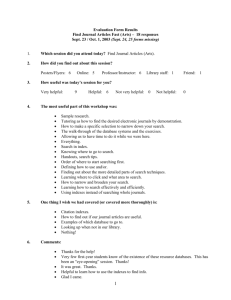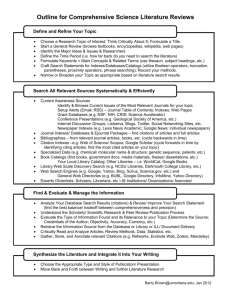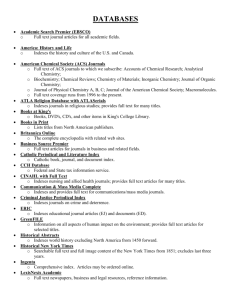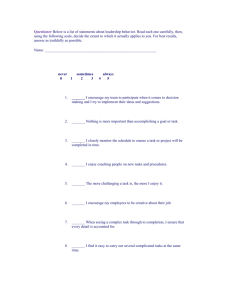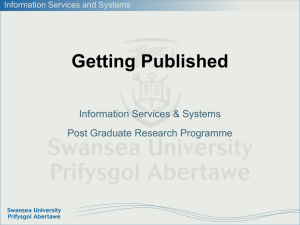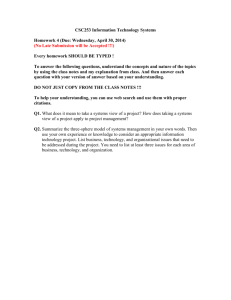Common Law English Legal Research Methodology
advertisement
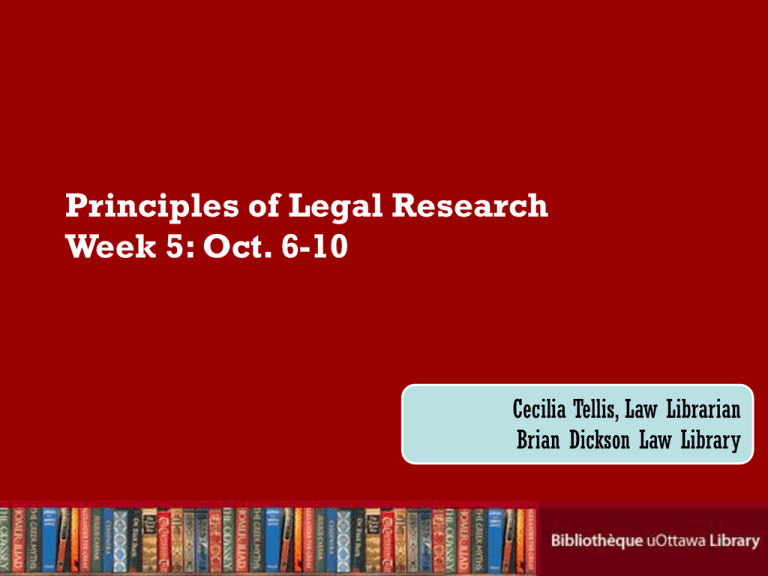
Principles of Legal Research Week 5: Oct. 6-10 Cecilia Tellis, Law Librarian Brian Dickson Law Library Outline defining an information need searching effectively locating scholarly articles – Periodical indexes – WestlaweCarswell & Quicklaw locating e-journals interpreting citations to secondary sources Visit to the Human Rights Research & Info. Centre, Alan Fleichman, Librarian (FTX 550) Secondary Legal Resources sometimes referred to as “commentary” They can be used to: – Obtain background information on a new or unfamiliar topic – Locate primary authority on a question being researched – Be relied on by the court when reaching a decision if there is no primary source governing a legal question or it is unclear how the primary source applies to the question at hand. What kind of information do I need? Overview Case comment Treatise Book Secondary sources Dictionary definition Law journal/review article Government publication Case law Legislation Primary sources Effective database searching Research database: an organized collection of information used to identify credible sources Which one should I use? – Verify content, coverage, dates Subject searching vs. Keyword searching A subject search involves searching for a pre-defined subject heading in a database. A keyword (or word) search retrieves words or phrases from several important fields, usually title, subject and abstract. Use Boolean operators to combine search terms: AND, OR, NOT Use AND to narrow a search – bankruptcy and corporation Use OR to expand a search – bankruptcy or insolvency Use NOT to exclude a term – bankruptcy not “European Union” Search techniques Truncation: allows you to search for a root form of a word and pick up any ending – tax? will retrieve • taxes • taxation • taxing Search techniques Field-specific searching: to focus your search in a database Apply limits: date, language, etc. Search techniques Phrase searching: will find terms beside each other Use “ ” quotations around terms Or phrase search option Search techniques Nesting: using parentheses ( ) to ensure that Boolean operations are performed in the sequence you intend crime AND (adolescents OR teenagers OR youth) Will retrieve all of the following: Crime is on the rise amongst teenagers. Adolescents sometimes turn to crime when … Petty crime has declined amongst the youth in this city. Tips Search the footnotes & bibliography to find other sources Think of QL and WL as databases composed of multiple databases – you need to narrow in on the most relevant one Look out for the Help icons in databases if you need a bit of guidance Look before you type or click! Is there a more specific field in which you can search? Using Periodical Indexes to locate Commentary Periodical Index: a type of database that includes a listing of citations to periodical articles in a specific field or discipline, often arranged by subject and author – When do you use a periodical index? – Which one do I use? Important tip! The library catalogue will not identify articles found in journals and magazines. How to access them Listed in alpha order… Periodical indexes: full-text, citation or both Not all indexes will include full-text Some will just have citation information Some will include a link: afficher! get it! – May lead you to the full-text – May tell you to search the library catalogue – May tell you that it’s not available in full-text Examples of Online Indexes: LegalTrac – indexes about 800 major legal publications (from the U.S., Canada, the U.K., Ireland, Australia and New Zealand) such as law reviews, legal newspapers, bar association journals, and international legal journals. – law-related articles published in over 1,000 general interest and business journals are also indexed. Examples of Online Indexes: Index to Legal Periodicals Full-Text Cites articles written since 1982 from more than 600 legal periodicals, and indexes some 2000 law books per year. Full text of over 200 select periodicals, as far back as 1994. Includes law reviews, bar association journals, university publications, yearbooks, institutes’ and government publications. Examples of Online Indexes: Index to Legal Periodicals Retrospective cumulates citations from print editions of Index to Legal Periodicals published between 1908–1981. Periodical coverage includes law reviews, bar association journals, university publications, yearbooks, institutes, and government publications. Examples of Online Indexes: Index to Foreign Legal Periodicals indexes more than 450 worldwide legal publications, including Canada, and published in several languages as well as French and English bibliographic references to articles, book reviews, essay collections and congress reports covering a wide variety of legal topics. Articles about the legal systems and practices of all countries are indexed except for those pertaining to the "common law" systems (United States, United Kingdom and Commonwealth countries). Warning: only 8 simultaneous users Examples of Online Indexes: Index to Canadian Legal Literature via WestlaweCarswell a component of the Canadian Abridgment a bilingual index and bibliography of English and French Canadian legal literature including articles, monographs, government publications, audio-visual materials, case comments and annotations. ICLL is divided into five sections, enabling you to look for legal literature by subject, author, case, statute and book review. Print volumes are available at FTX REF KE 173 .C33. Available electronically via WestlaweCARSWELL as well as Quicklaw Week 7: Oct. 22-26 Examples of Online Indexes: Index to Canadian Legal Literature via Quicklaw “Search for a Source” in the Source Directory Quicklaw – Commentary tab search within local and international commentary sources such as law journals, NetLetters™ and legal treatises, as well as Words & Phrases. Quicklaw – Journals tab Default is “All Canadian Legal Journals” contains the full text of all academic journals (Eng. & Fr.) made available through LexisNexis QuickLaw (32 in total) Can also search International Journals Locating eJournals Search the library catalogue ► Available electronically if you see “Click for Electronic access” ►From the E-Journals (A-Z) list on library webpage ►Some eJournals are not listed in the catalogue and are “hidden” in WestlaweCarswell and Quicklaw Check University of Toronto’s webpage listing eJournal titles Connecting from off-campus For eJournals and other library resources to which we subscribe (e.g. HeinOnline) Instructions Week 7: Oct. 22-26 Interpreting citations to secondary sources Book citation (see 6.2.1 in McGill Guide) 1 Margaret Somerville, Death Talk: The Case against Euthanasia and Physician-Assisted Suicide (Montreal: McGill-Queen’s University Press, 2001) at 78. 3 Interpreting citations to secondary sources (cont’d) Journal article (see 6.1 in McGill Guide) 1 John Borrows, “Creating an Indigenous Legal Community” (2005) 50 McGill L.J. 153 at 155. 3 Interpreting citations to secondary sources (cont’d) Magazine article (see 6.13 in McGill Guide) 1 Benjamin Phelan, “Buried Truths” Harper’s Magazine, 309:1855 (December 2004) 70. 3 4 5 Interpreting citations to secondary sources (cont’d) Government document (see Ch. 4 in McGill Guide) 1 2 3 Ontario, Legislative Assembly, Standing Committee on regulations and private 4 5 bills, “Election of Chair” in Official Report of Debates (Hansard), No.T-6 (26 September 2001) at 41. 6 Interpreting citations to secondary sources (cont’d) Essay in a book (see 6.3 in McGill Guide) Gabriel J. Chin, “Race, the War on Drugs and Collateral Consequences of Criminal Conviction” in Christopher Mele & Teresa A. Miller, eds., Civil Penalties, Social Consequences (New York: Routledge, 2005) 43 at 45. Interpreting citations to secondary sources (cont’d) Internet site (see 6.19.3 in McGill Guide) Henry Samuel, “March for girl set alight after marriage refusal” The Daily Telegraph (28 November 2005), online: The Telegraph Group <http://www.telegraph.co.uk>. Human Rights Documentation Centre Comprehensive and specialized domestic and international human rights documentation collections Alan Fleichman, Librarian On-site consultation only Website Human Rights Online Catalogue
